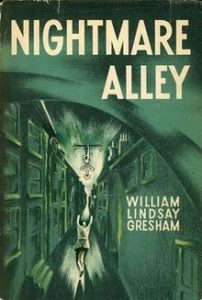
Nightmare Alley
By William Lindsay Gresham
304 pages
Originally published in 1946 by Rinehart & Co.
Every so often we Mules (my book club) select not just a book of the month, but a movie to go with it. Our book for January was new to me: Nightmare Alley by William Lindsay Gresham. And we watched two film adaptations with the same name – one from 1947 and a recent remake that is still playing in theaters.
Nightmare Alley is the story of the rise and fall of Stan Carlisle, from hapless young carnival hustler to nightclub magician to mentalist-preacher-con man of the social elite. Gifted and ambitious, he’s not the only morally questionable character in this inverted bildungsroman. The entire population of the novel is comprised of broken and incomplete and self-interested people trying to make their journey through Gresham’s social landscape of fate and failure.
Nightmare Alley is The Grifters meets Freaks. It’s Jim Thompson meets Tod Browning meets Dostoyevsky. It’s everything you could want from noir fiction with an extra dash of fatalism lifted from the darkish lyricism of Cormac McCarthy.
In short, it’s one of the best books I’ve read in a long time.
What I Liked About It
* As I said, it has the best elements of noir literature – grim, dark, fatalistic. A view of human nature through gray-colored glasses.
* Riveting interior monologue – as good as John D. MacDonald’s.
* Vernacular dialog equal to James Ellroy’s and Dashiell Hammett’s.
* Lots of vivid and elucidating details about the carnival world.
What I Didn’t Like
It was long. And I don’t like long books because I don’t have a lot of spare time to read. But I half-read and half-listened to it. And because it was so damned good in so many ways, I finished it in time for the Mules meeting.
Critical Reception
Nightmare Alley got the recognition and praise it deserved:
* “For fans of vaudeville and magic, the book is a treasure trove of trade secrets.” (Walter Kirn, New York Times)
* “While I’ve known for a long time that Nightmare Alley was an established classic of noir fiction, I was utterly unprepared for its raw, Dostoyevskian power…. It’s more than just a steamy noir classic. As a portrait of the human condition, Nightmare Alley is a creepy, all-too-harrowing masterpiece.” (Michael Dirda, Washington Post)
* “Nightmare Alley remains a masterpiece, not only due to its driving narrative power, but because it’s underpinned by the premise that the human animal is alone, helpless in the face of destiny, stumbling in the dark… toward the inevitable wall of death at the end. Yet we can’t stop ourselves hoping, and fearing, that there might be something beyond that wall. The message of this disquieting book couldn’t be more human, yet that message is metaphysical rather than moral.” (Richard Rayner, Los Angeles Times)
